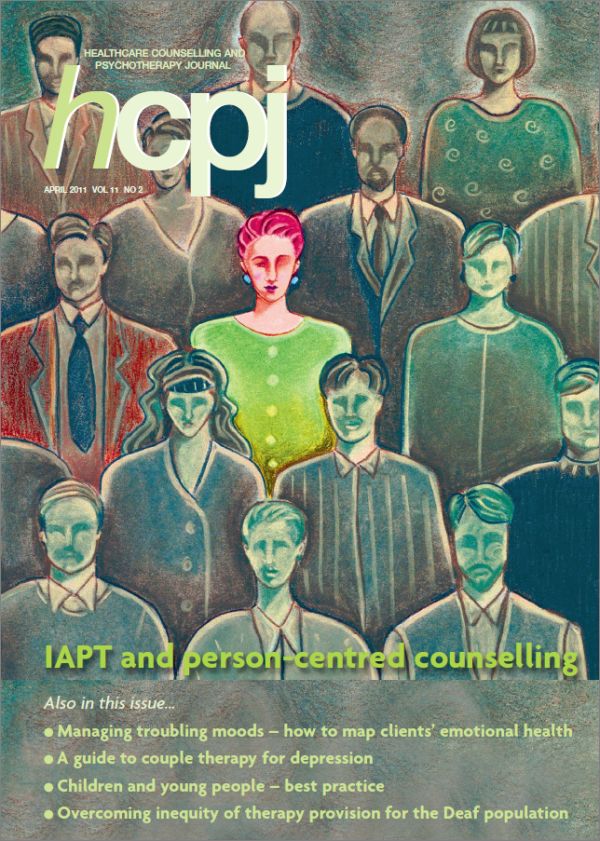In this issue
IAPT and counselling
A brief overview of the inclusion of other therapy modalities in the IAPT programme
Opinion
Despite the roll-out of IAPT to cover all NICE-approved modalities, Isabel Gibbard’s dream of recruiting more person-centred counsellors hasn’t become a reality as yet
In practice…
Gillian Haines shares her experiences of training in interpersonal psychotherapy
IAPT for Deaf people
Hazel Flynn reports on the inequity of service provision for the Deaf population, and the progress being made to overcome the challenges
Management of anxiety
John Cape, Melissa Chan, Karina Lovell, Judy Leibowitz and Tim Kendall provide details of the latest NICE recommendations
Mapping the way to emotional health
Liz Miller, creator of a system designed to manage troubling moods, takes practitioners through the essentials of the approach
Best practice
With a strong emphasis on partnership working, the IAPT model has been adapted to serve a younger population in Bury, explain Pallavi Bala, Kirsty Pratt and Claire Maguire
Children and young people: ‘joined up thinking’?
Legal issues around the rights of children and young people to confidentiality and privacy need to be addressed, argues Peter Jenkins
Groupwork
Sheila King’s research exploring counsellors’ use of groupwork found them willing and able to meet the challenges of changing practice in the NHS
GP viewpoint
It’s not the treatment modality that’s important, it’s the end result, says John Hague
A guide to… couple therapy for depression
David Hewison outlines one of the modalities in the IAPT programme
Research matters
For Sara Perren, feedback from practitioners involved in major research has been important to the integrity of the trial she is involved in
On the receiving end
Counselling helped Megan Brown explore feelings but it wasn’t enhanced by the wait for therapy and the counsellor’s self-disclosure
In training…
For Suzanne Adey, training in supervision has revitalised her practice
Web resources: depression
Key websites for further information
BACP Healthcare update
Chair Tina Campbell and BACP healthcare development manager, Louise Robinson, give a round-up of winter activity

Articles from this issue are not yet available online. Divisional members and subscribers can download the pdf from the Healthcare Counselling and Psychotherapy Journal archive.
Editorial
Towards the beginning of the year, via Talking Therapies: a four-year plan of action1, the Government announced £400 million to extend access to psychological therapies, making a choice available in NICE-approved therapies.
It seems a relief, after a period when some counsellors felt margalised, and some lost their jobs, that counselling for depression (CfD) is included in the programme as a NICE-approved therapy, along with interpersonal psychotherapy (IPT), brief dynamic interpersonal therapy (DIT) and couple therapy for depression (CTD). Training, which includes a five-day taught programme and supervised clinical practice, is ongoing.
Following on from an introductory piece on the story so far for counselling in IAPT, Isabel Gibbard provides thought-provoking comment on the inclusion of CfD from her perspective as a person-centred practitioner. Also on the subject, counsellor Gillian Haines shares her experiences of training in IPT, David Hewison writes our guide to couple therapy for depression, and John Hague writes from a GP’s perspective on what the introduction of the programme has meant to him and his patients.
In the next four years, to 2015, the nationwide roll-out of IAPT psychological therapy for adults will be completed and will include the initiation of a standalone programme for children and young people. Those looking to the future will be interested to read about the work of Pallavi Bala and colleagues, who, in our best practice feature, outline how IAPT services have been adapted for children and young people in Bury. Their article will give food for thought about how best to go about organising services to ensure the right skills, perhaps through working with third sector providers who have existing experience and staff in place; their feature is augmented by an informative article by Peter Jenkins, who touches on just one of the challenges when it comes to implementing services for young people – legal issues around rights to confidentiality and privacy.
I hope you find this issue enjoyable and interesting. As ever, I’d love to hear from anyone involved in healthcare counselling and psychotherapy about what all this means to you and to your work. In addition, feedback is welcome on anything that appears in the pages of HCPJ, and you’ll find prompts at the end of each piece with contact details. Look forward to hearing from you.
Sarah Hovington
Editor
hcpj.editorial@bacp.co.uk
Reference
1 Department of Health. Talking therapies – a four year plan of action. London: DH; 2011.
